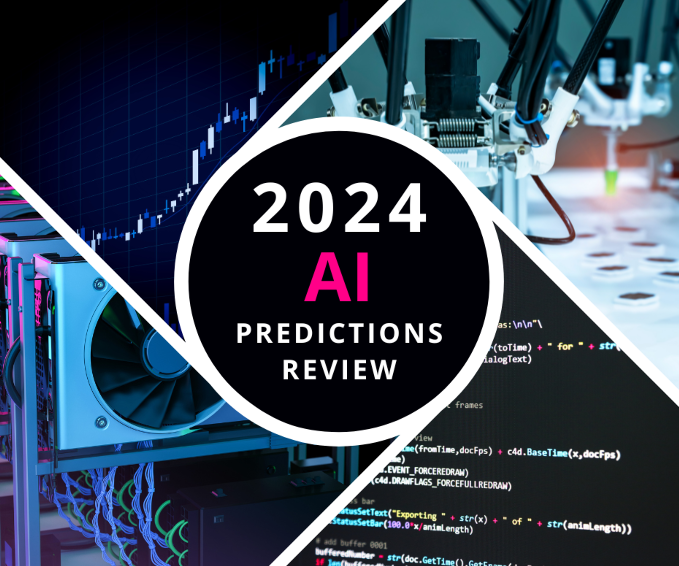At the end of last year, Radical Ventures partner Rob Toews published a list of 10 predictions in Forbes about the world of artificial intelligence in 2023. With 2023 drawing to a close, Rob published a followup article to evaluate how those predictions actually played out. We share a summary of these evaluations below.
Prediction 1: GPT-4 will be released in the next couple months—and yes, it will be a big deal.
Outcome: Correct
OpenAI released GPT-4 on March 14, 2023. It was indeed a big deal. In last year’s predictions, we speculated that GPT-4 might be multimodal. While the initially released version of GPT-4 did not have multimodal capabilities, OpenAI has since announced an updated version named GPT-4V (the V stands for “vision”) that can analyze images as well as text. Expect this trend to continue, with OpenAI’s models becoming increasingly multimodal—incorporating audio, video, music and beyond—as time goes on.
Prediction 2: We are going to start running out of data to train large language models.
Outcome: Correct
In last year’s predictions, we noted that there is a finite amount of text data in the world available to train language models (taking into account all the world’s books, news articles, research papers, code, Wikipedia articles, websites, and so on)—and predicted that, as LLM training efforts rapidly scale, we would soon begin to exhaust this finite resource. A year later, we are much closer to running out of the world’s supply of text training data. Those at the cutting edge of LLM research are well aware of this problem and are actively working to address it.
Prediction 3: For the first time, some members of the general public will begin using fully driverless cars as their day-to-day mode of transportation.
Outcome: Correct
Two companies, Alphabet’s Waymo and GM’s Cruise, made driverless car services available to members of the public in 2023—just like Uber, but with no one behind the wheel. Many dozens of residents in San Francisco and in Phoenix began to use fully driverless vehicles as their go-to mode of transportation this year: to commute to and from work, to get around on the weekends, to get home after a night out. With Cruise now floundering, Waymo appears poised to emerge as the clear leader in this nascent market as we head into 2024.
Prediction 4: Midjourney will raise venture capital funding.
Outcome: Wrong
Midjourney managed to resist the siren call of venture capital this year after all. It was not for lack of trying on the part of venture capitalists.
Midjourney, which generates images from text prompts, is one of the hottest generative AI startups in the world. It has tens of millions of users and is reportedly on track to do $200 million in revenue in 2023. It has accomplished all of this without raising a cent of outside capital. Seemingly every venture capitalist in Silicon Valley has tried to court Midjourney CEO/founder David Holz and convince him to take their money. Holz continues to politely refuse them all.
Prediction 5: Search will change more in 2023 than it has since Google went mainstream in the early 2000s.
Outcome: Correct
In 2023, a radically new internet search experience went mainstream: a conversational interface powered by a large language model trained on the entire internet. In 2023, for many millions of people, ChatGPT rather than Google became the go-to destination to find information online.
The rapid rise of conversational search this year goes beyond ChatGPT. Google itself has rolled out a chat-based search product called Bard, which has well over 100 million users. Microsoft Bing has launched a similar product. Younger upstarts with similar offerings including Perplexity and You.com have likewise seen rapid adoption.
And internet search is not the only kind of search that is being revolutionized by large language models.
Enterprise search—the way that organizations navigate and retrieve their internal data—is likewise undergoing a profound transformation. A new generation of LLM-powered enterprise search platforms like Glean and Hebbia have seen dramatic revenue growth this year as customers rapidly adopt these more powerful enterprise search experiences.
Prediction 6: Efforts to develop humanoid robots will attract considerable attention, funding and talent. Several new humanoid robot initiatives will launch.
Outcome: Correct
2023 was the year that humanoid robots began to go mainstream. Leading the charge in this area is Tesla, whose humanoid robot effort known as Optimus advanced by leaps and bounds this year. Alongside Tesla, a promising cohort of humanoid robot startups emerged and attracted considerable buzz and funding this year. As with autonomous vehicles, the development and deployment of humanoid robots will play out over many years. It will not happen overnight. But the field took a big step forward in 2023.
Prediction 7: The concept of “LLMOps” will emerge as a trendy new version of MLOps.
Outcome: Correct
It is easy to forget that, as of the end of 2022, “LLMOps” was a term that hardly anyone used or was familiar with. The idea of LLMOps has proliferated in 2023. Introductory blog posts on LLMOps have been published by everyone from Weights & Biases to Databricks to Microsoft to IBM. CB Insights recently released an LLMOps market map; numerous VC firms have penned thought pieces on the topic. LLMOps—that is, tooling for large language models—has indeed become an important new category this year as adoption of language models has spread.
Prediction 8: The number of research projects that build on or cite AlphaFold will surge.
Outcome: Correct
According to Google Scholar, the original AlphaFold paper was cited ~12,800 times in 2023, almost double the figure from 2022 (~6,850).
Prediction 9: DeepMind, Google Brain, and/or OpenAI will undertake efforts to build a foundation model for robotics.
Outcome: Correct
The concept of foundation models for robotics gathered real momentum this year. In June DeepMind announced its RoboCat model, “a self-improving foundation agent for robotic manipulation,” which is trained on a sufficiently diverse dataset that it can generalize to new tasks and new hardware with little or no fine-tuning. A month later, another Google team published Robotic Transformer 2 (RT-2), a “vision-language-action model” that combines web-scale knowledge (like that possessed by GPT-4) with the ability to take action in the real world.
On the startup side, a handful of companies including Covariant is likewise pushing forward the state of the art in robotics foundation models. Foundation models for robotics are less mature today than are foundation models for language. Their ultimate impact, though, may prove even larger.
Prediction 10: Many billions of dollars of new investment commitments will be announced to build chip manufacturing facilities in the United States as the U.S. makes contingency plans for Taiwan.
Outcome: Wrong
The semiconductor manufacturing supply chain and the geopolitics of AI chips have only become more important topics in 2023. But compared to 2022, when several massive investment commitments were made to build semiconductor manufacturing facilities on US soil ($40 billion from TSMC in Arizona, up to $100 billion from Micron in New York, $30 billion from Intel in Arizona, another $20 billion from Intel in Ohio), very few such net new commitments were made in 2023.
Despite the shortage of new commitments this year, make no mistake: bringing semiconductor production to US soil remains a major long-term priority for the US government and an important dynamic to keep an eye on going forward.
Read the article in full. We will share Rob’s 2024 predictions in an upcoming edition of Radical Reads.
AI News This Week
-
Lunch with the FT – AI scientist Fei-Fei Li: ‘Maths is pretty clean. Humans are messy’ (Financial Times)
Fei-Fei Li, a leading AI researcher, professor at Stanford University, and Radical Scientific Partner, emphasizes the importance of academia in the responsible development of AI. Li has just published her autobiography The Worlds I See, recounting her journey from China to the US as a teenager and her path to Stanford. She also reflects on her struggle with AI’s gender imbalance and her commitment to ethical AI development. Her story highlights the need for diverse perspectives in shaping the future of AI and the critical role universities play in balancing the influence of private corporations in the field.
-
Laredo wants to use GenAI to automate dev work (TechCrunch)
There is an increasing trend towards the adoption of AI in software development, with a notable 77% of developers endorsing its integration to boost productivity and accelerate learning according to one survey. Laredo Labs, co-founded by Mark Gabel and Daniel Lord, developed an AI-driven code generation platform that is currently in private beta and is designed to interpret and execute high-level language commands for a variety of coding tasks. Mark Gabel, formerly the chief scientist at Viv Labs (acquired by Samsung in 2016 to enhance its Bixby voice assistant), and Daniel Lord, an ex-platform engineer at Siri before Apple’s acquisition, bring a wealth of experience to Laredo Labs. Radical Ventures co-led the seed round with Horizons Ventures.
-
AI Startup Delphina Gets Funding to Help Firms Build Data Models (Bloomberg)
Delphina raised a seed round from investors including Radical Ventures, Stanford professor Fei-Fei Li and Costanoa Ventures, seeding the startup’s effort to help clients build AI models in fields from finance to retailing. Delphina is founded by two former Uber ML and data science leaders, Jeremy Hermann and Duncan Gilchrist, who built features such as time-of-arrival predictions platform Michaelangelo.
-
EU Agrees on landmark artificial intelligence rules (New York Times)
The EU’s AI Act, a first-of-its-kind regulation for artificial intelligence, targets high-risk uses in law enforcement and essential services, adding transparency requirements for systems like ChatGPT and clear labelling of AI-generated content. Awaiting final approval, it sets stringent facial recognition constraints and proposes severe penalties for breaches. The Act calls for risk evaluations and human oversight for AI tools considered high-risk. However, its enforcement, involving 27 countries and necessitating new expert hires amid budget constraints, is uncertain, with anticipated legal challenges as companies navigate these new regulations.
-
Research: Mathematical discoveries from program search with large language models (Nature)
Large language models (LLMs) have demonstrated tremendous capabilities in solving complex tasks, from quantitative reasoning to understanding natural language. However, LLMs sometimes suffer from confabulations (or hallucinations) which can result in them making plausible but incorrect statements. This hinders the use of current large models in scientific discovery. Researchers at DeepMind have developed “FunSearch”, which uses LLM-guided function search to find solutions to open problems in mathematics and computer science. It tackled the capset problem and discovered some of the largest capsets to date.
Radical Reads is edited by Ebin Tomy.





